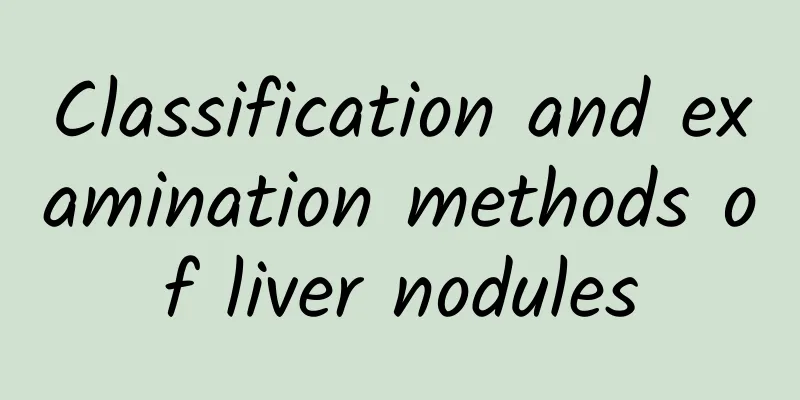Classification and examination methods of liver nodules

|
Liver nodules refer to the proliferation of fibrous tissue inside the liver and the disordered arrangement of liver trabeculae. Liver nodules can be divided into benign nodules and malignant nodules according to the different conditions of the disease. If you want to determine whether a liver nodule is benign or malignant, you can do a routine liver ultrasound examination to make a judgment. Below I will introduce to you the classification and examination methods of liver nodules. 1. Benign nodules Common ones include liver cysts, hepatic hemangiomas, focal nodular hyperplasia, etc. They generally grow slowly and have little impact on human health. They do not require special treatment and generally only require regular follow-up. However, if the nodule is too large and causes compression symptoms, surgical treatment can be considered. 2. Malignant nodules It is also what we often call a malignant tumor. It mainly includes hepatocellular carcinoma, cholangiocarcinoma, gastrointestinal tract, gallbladder, breast and other metastatic tumors. Malignant tumors grow invasively, rapidly, and easily metastasize, posing a serious threat to life. Once discovered, treatment must be given as soon as possible without delay. 3. Routine Ultrasound Examination of the Liver Ultrasonic examination has the advantages of being cheap, convenient and non-invasive. For routine ultrasound examinations, patients are advised to fast for more than 8 hours to reduce the impact of gastrointestinal gas on liver image quality. Conventional ultrasound can display the size and shape of the liver, the intrahepatic parenchymal structure, the duct system, the direction and distribution of blood vessels, determine the presence or absence of liver nodules, the specific size and location, and preliminarily identify the benign or malignant nodules. It is suitable for routine physical examinations and regular review of nodules. Although conventional ultrasound is the preferred examination method for the liver, further qualitative diagnosis of intrahepatic nodules and clarification of the blood supply of nodules require the assistance of ultrasound angiography. Contrast ultrasound is done by injecting ultrasound contrast agent into a vein. It is suitable for lesions that need further diagnosis after routine ultrasound examination, suspicious lesions in patients with chronic hepatitis or cirrhosis, and suspicious lesions in patients with a history of malignant tumors. When MRI, CT, or other imaging results are unclear or inconsistent, more imaging information can be provided. |
<<: What are the symptoms of bullae? Three major symptoms of bullae
>>: What are the symptoms of palms of the hand? Causes and prevention of liver palms
Recommend
Why do I feel a dull pain in my lower abdomen after medical abortion?
After medical abortion, there may be a dull pain ...
Cupping and bloodletting on the face to treat acne
When dealing with acne, people generally choose ge...
What medicine should I take for reflux pharyngitis?
Reflux pharyngitis is a type of pharyngitis. It m...
Why does it hurt when pressing and blinking the outer corner of the eye?
In daily life, many people look at computers or m...
Ankle sprain sequelae
If you accidentally twist your ankle, which we ca...
How to get enough sleep
Lack of sleep due to busy work every day. Lack of...
Symptoms of uremia
Uremia is a general term for a series of poisonin...
What is Ma Huang Sheng Ma Tang?
The knowledge of Chinese medicine is very profoun...
What is the best scar removal product for children?
Children's skin is particularly delicate. If ...
What are the symptoms of cold in girls
A large proportion of women have a cold constitut...
How to enhance heart function?
The heart is like life. Weak heart function will ...
What causes itching in boys' private parts?
For men, if private parts are itchy, they should ...
What are the side effects of splenectomy?
After splenectomy, you must pay attention to more...
Is the thick leucorrhea like paste caused by ovulation?
In real life, women's leucorrhea is also part...
What to do if you want to get pregnant but your estrogen level is low?
Estrogen is very important for women. If the horm...









